MISD Pilots New Texas K-3rd Grade Reading Academy Initiative
McKinney ISD has put the statewide, mandated K-3rd grade Reading Academy initiative into action this year with a pilot program at Minshew Elementary and Reuben Johnson Elementary. On the state's three year timeline, the district will expand the program to the district's remaining elementary schools over the next two years.
McKinney, Texas – In response to a statewide reading initiative set forth by the Texas legislature last year through HB3, McKinney ISD has implemented a Reading Academy pilot program at Minshew Elementary and Reuben Johnson Elementary.
Both schools volunteered to be the first in the district to test the waters.
The new reading initiative requires all K–3rd grade teachers in every Texas public school district, over the next three years, to complete the state’s 60-hour Reading Academy. In addition to classroom teachers, the mandate extends to any public education professionals who impact reading instruction in some way, such as media resource specialists, instructional coaches and campus principals.
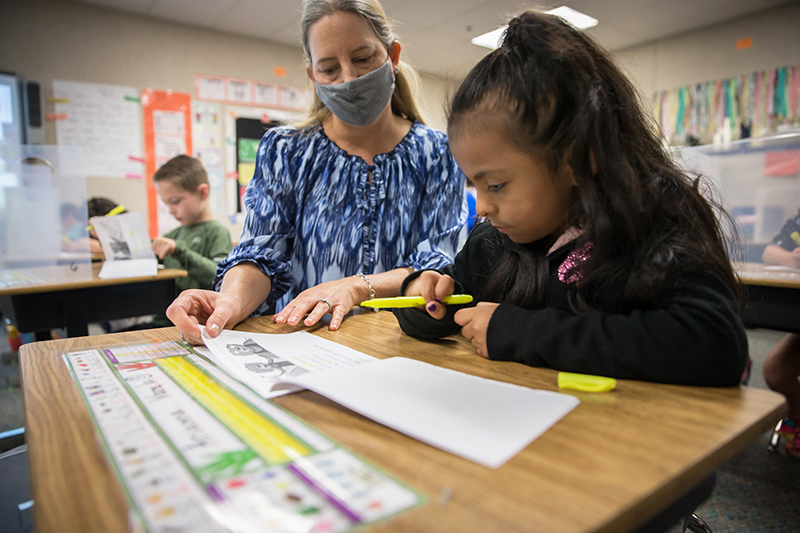
Minshew Elementary first grade teacher Dawn Lichtenwalter checks in with one of her students during a reading lesson.
Following this year’s pilot program at Minshew and RJE, MISD will expand the training to the district’s remaining 18 elementary campuses over the next two years.
MISD Senior Director of Curriculum and Instruction Garry Gorman and Reading Specialist Heather Rodriguez, who are spearheading implementation of the program in MISD, said that the goal that the state has put forth is to ensure that all Texas teachers understand both the science and art of reading instruction at the foundational level when students are first learning to read.
“Summed up, it’s making sure that every K–3rd grade teacher in the state understands how to teach reading—what you’re supposed to do, how to look for those indicators if a student is struggling. What do you do if you need acceleration? All of that wrapped up into one,” said Gorman. “It’s information that teachers may not have gotten in college or during certification training.”
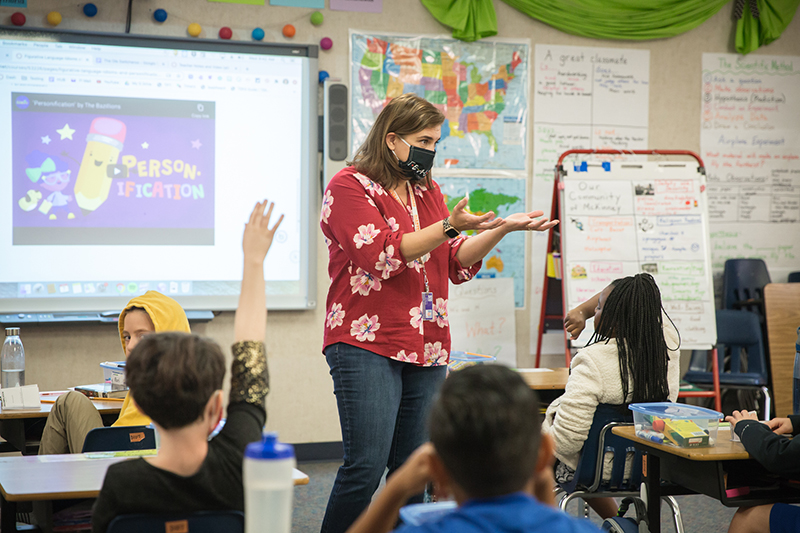
Minshew third grade teacher Becky Raymond guides a classroom discussion on idioms.
Rodriguez added, “The initiative is a foundation in best literacy practices to build capacity in our teachers, so that we’re all equipped with this background knowledge in the science and art of teaching reading. So, the result is that we have high quality, effective literacy instruction to support student success.”
The state training is no blow off course. To complete it, K-3rd grade teachers will move through 12 learning modules over the course of 11 months. Embedded in each module are quizzes and tests.
“The bigger assessment,” said Rodriguez, “is that there are two ‘artifacts’—one in the fall and one in the spring—that they are going to have to complete. In December they have an artifact due on phonological awareness, so they will video themselves presenting a phonological awareness lesson that they would teach to their students.”
The assessments will be submitted to the state for evaluation.
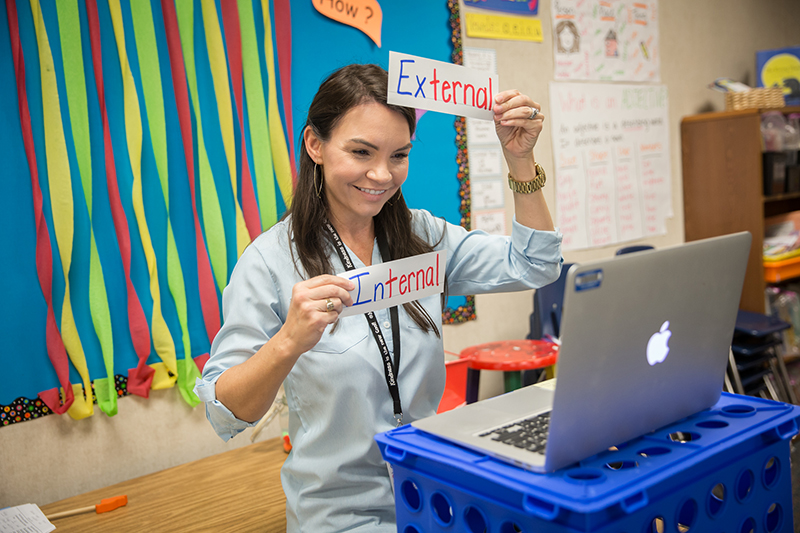
Minshew teacher Melissa Rushing teaches first grade virtual students: “While it is extremely time consuming, I do believe what we are learning through the Reading Academy will not only strengthen, refine and sharpen us as educators, but it will also help build a stronger literacy foundation that will allow all students to become thriving readers.”
The district hired Rodriguez, who has been certified by TEA to implement the Reading Academy. Only about 1 in 10 educators who applied actually earned the certification. “Heather’s knowledge and skills and what she brings to the table are amazing,” said Gorman.
As far as teachers are concerned, most recognize that there is always room to learn more, regardless of how long they’ve been in the classroom.
Gretchen Clark is a second grade teacher at Minshew. She’s a master of her craft who has honed her skills through nearly 20 years of practice. On a recent Wednesday morning, Clark’s eyes lit up as she pointed emphatically toward a second grade student seated to one side of her semicircle desk.
“That’s right!” she exclaimed in response to the answer he offered. She had a trio of students spaced around the desk, reading words aloud that she held up on small rectangles of paper.
It was her class’s reading period, and Clark’s students were busy with their work all around the room, each immersed in the particular literary pursuit they’d selected from the options Clark provided—like a three ring circus with absolutely no chaos or noise or distraction, all skillfully guided by Clark—and just as impressive to observe.
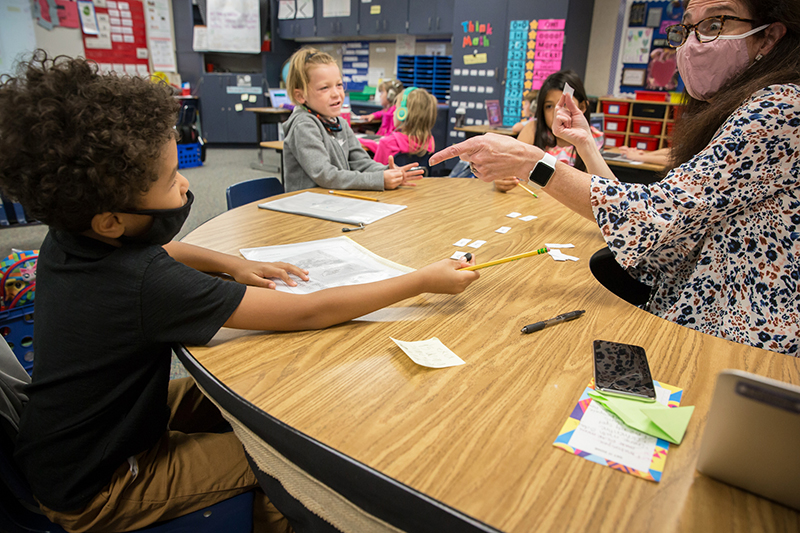
Second grade teacher Gretchen Clark guides her students through a reading lesson at Minshew Elementary.
And, yet Clark has looked for ways to use the Reading Academy to up her game.
“Going through it reminds us that reading isn’t really just looking at the words,” said Clark. “There’s so much more to it, and it’s helping me to find the gaps, I think. It’s not a program. It’s really more like a roadmap. It tells you that these are the things you have to make sure are in place before these kids can be successful in reading and literacy.”
At RJE, first grade teacher Laura Shade is in her 31st year of teaching. But, she has no plans to rest on her laurels or coast toward retirement. She said that the first few modules have served as great refreshers.
“It takes a lot of time,” she said. “But, it is well worth the time because it’s a good reminder—and I wish we could have had it 30 years ago. But, it also lets you know, ‘Oh, I’m doing that. Good!’ It gives you kudos. ‘That’s stuff I am doing; this is stuff that I can improve on.’”
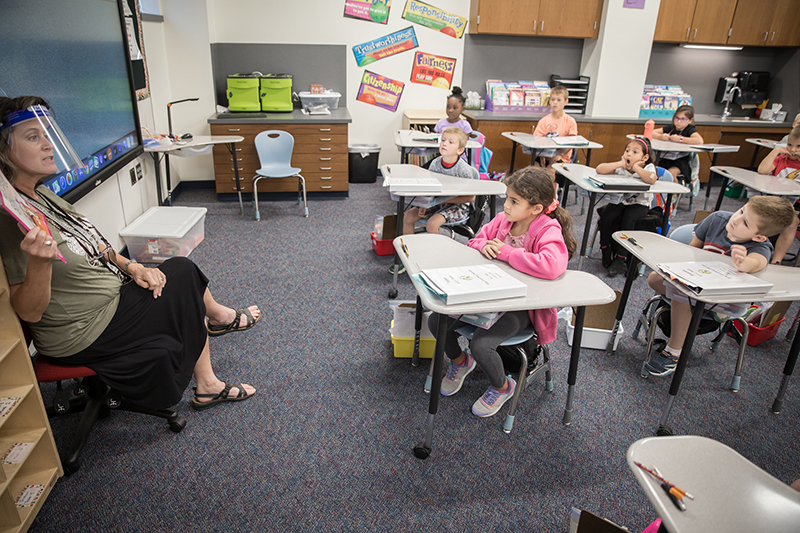
Reuben Johnson Elementary first grade teacher Laura Shade introduces a new book to her class.
Rodriguez has also seen evidence that the Reading Academy is having a positive impact on reading instruction.
“A teacher emailed us a video of her class that showed the oral language lesson they were doing,” said Rodriguez. “She changed up her morning lesson after she did the Reading Academy oral language and vocabulary module. So, she was really excited, and she sent it to the principal and her instructional coach and to me. So, that’s the goal, that we take what teachers are learning—and put it into practice.”
Need Help?
If you need additional assistance with the content on this page, please contact MISD Communications Department team member Shane Mauldin by phone at 469-302-4007 or by email here .